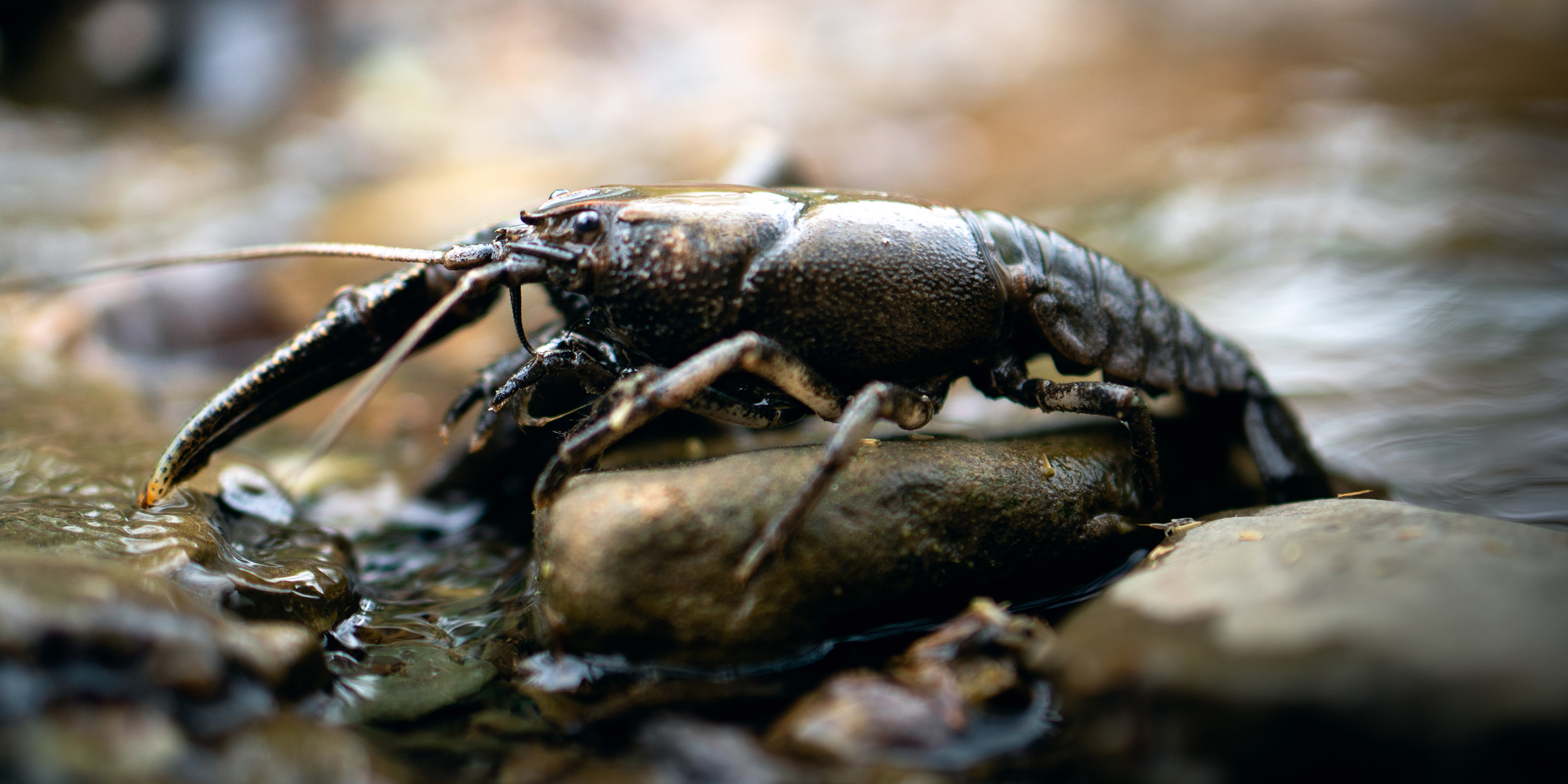Originally published 16 November 1998
Seven a.m. The meadow mists are tinged gold by the rising sun. I cross the plank bridge over Queset Brook, skirt the water meadow, then take the higher path through the old orchard.
And there on the path I meet a crayfish.
On hard, stony ground. Eight-hundred feet from the creek and 300 feet from the nearest mud or water.
Crayfish take their name from the word “crevice.” Nothing to do with fish at all. They are freshwater cousins of lobsters and crabs, evolutionary migrants from the salty sea, that like to hide in crevices and burrows. More to the point, they are 100 percent aquatic, and mostly nocturnal.
What was this fellow doing out in the open, on dry land, in daylight?
My crayfish was an adult, about six inches long, with lobster claws and a mess of legs. Two BB eyes looked up from the tips of stalks. Somewhere inside that brown exoskeleton was a BB brain not much bigger than the eyes.
Not impossible, I suppose, that he was dropped on the path by a heron or raccoon that had taken him from the stream. But his carapace was unbroken, his limbs and antennae intact; no evidence of damage by beak or jaw. He was not in the most robust shape, but by all appearances he seemed to have found his own way into his present predicament.
I hunkered down on the path and watched him, prodded him, offered a twig to his lethargic pinchers.
This guy belongs in the stream, I thought.
So I picked him up and walked back to the bridge. I was about to drop him in, then thought: Who am I to say why this fellow was on the path? Crayfish breed in this late season; maybe he is on some amorous mission I know nothing about.
So I took him back to his place on the path.
But I paused again. Naw, I thought. Some predator must have dropped him here.
Back to the bridge, and this time I plopped him in.
He sank like a stone to the bottom.
For the rest of my walk I wondered: What was that all about? Why so much shilly-shallying about my intervention? I wouldn’t have given the crayfish a second thought if I met him in a Cajun stir-fry. And I had let myself get sucked into a silly dilemma: To put him in the stream or let him be?
My minor moral muddle reflects in miniature a major debate whose outcome will affect the shape of the world to be inherited by our great-grandchildren in the next century: To manage nature, or keep hands off?
The latter view is popular among the current generation of Sunday conservationists and nature writers. According to this view, wild, nonhuman nature is based on balance and harmony. Back in the Neolithic, humans lived as part of the balance. But science and technology have shredded the mystic fabric, driven God from the temple. Or so the story goes.
“If we can only step aside and trust in nature, life will find a way,” says a character in Stephen Spielberg’s movie The Lost World. He speaks for those who would keep hands off.
On the other side of the debate are the managers — nature’s keepers — who believe the only way to save natural environments is to apply principles of scientific ecology.
Even those environments we think of as wild and free are products of tens of thousands of years of human intervention, say the keepers. Untrod nature is a romantic myth, and letting nature have its way won’t save a single threatened species or natural environment. What is required is scientific management, based on sound ecological research.
“No matter what we choose to do, nature is shaped by man,” says environmentalist writer Stephen Budiansky. “We can accept the fact and try to deal with it, or we can ignore it and accept the consequences. The one thing we cannot do is remove human influence simply by closing our eyes to it.”
Do we put out forest fires caused by lightning, or let them burn? Do we cull deer herds, or let them multiply unchecked? Do we build jetties to save eroding beaches, or let the sea have her way?
These are difficult questions, and so far the record of success by the nature managers has not been impressive. On the other hand, incessant hectoring by prophets of environmental doom has done nothing to reverse the course of technological civilization and turn us back to Neolithic ways, nor will it.
My own feeling is that management is the only way forward, and that we had better learn a lot more good ecological science, fast. Human domination of this planet is a fact of life that is not going away, and the idea of nature as separate and wild is bankrupt romanticism.
If we want our great-grandchildren to have access to natural environments and maximum biodiversity, we should put our taxes where our mouths are and support the acquisition and application of scientific ecology. What we need are more and bigger nature preserves, protected rivers, national parks — artificial to be sure, as artificial as the Bronx Zoo or Central Park, but better than a world paved over with tract houses and asphalt.
And the crayfish? God knows what was his fate. But I’m glad I intervened. All things considered, my little act of ecosystem management was probably good for crayfish — and maybe good for my great-grandchildren too.



